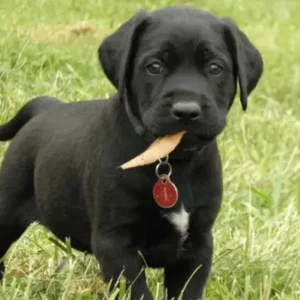Biewer Terrier History/Origin
The Biewer Terrier originated in Germany in 1984 when two tricolor puppies were born in the kennel of experienced Yorkshire Terrier breeders Werner and Gertrude Biewer. The Biewer Terriers trace their origins to the foundational pair, Darling von Friedheck and Fru Fru von Friedheck.
A veterinarian friend suggested calling the dogs Biewer Yorkshire Terriers. Soon after, a famous German singer became fond of the breed and added the phrase “a la Pom Pon” to their name.
Over the years, the Biewers focused on developing a stable population of these charming little dogs through selective breeding.
Biewer Terrier History- Source: AKC.org
In 2002, American dog enthusiasts started importing the breed from Germany. The dogs quickly gained popularity in the United States., and by 2006, clubs were formed to protect and promote the breed, leading to the establishment of the Biewer Terrier Club of America (BTCA).
In 2007, the BTCA reached out to Mars Veterinary to determine if the Biewer Terrier was a unique breed or just a variation of the Yorkshire Terrier. By September, the lab was ready for DNA testing, and BTCA members submitted blood samples for analysis.
The results confirmed that the Biewer Terrier was indeed distinct from the Yorkshire Terrier, leading to further testing to solidify the findings.
In 2014, the American Kennel Club added the Biewer Terrier to their Foundation Stock Service. By 2021, the AKC officially recognized the Biewer Terrier as a full, pure breed within the Toy Group.
Biewer Terrier Personality
The Biewer Terrier is one of the dog breeds that is loving and affectionate nature, always eager for attention. His whimsical and playful behavior makes him a joy to be around, and he enjoys trying new things. Most Biewer Terrier owners love his cheerful spirit and enthusiasm for play.
Although he may be a little cautious around strangers at first, he quickly warms up once he feels comfortable. When raised with other dogs, he gets along well, showcasing his friendly and sociable nature. His ability to form strong bonds makes him a wonderful companion and a lap dog, especially for families with older children.
- Potential Challenges
The Biewer Terrier can come with a few challenges that require attention. Without proper socialization, he may become wary of strangers, leading to excessive barking or yappiness. His strong-willed nature can make him somewhat demanding, and adjusting to homes with larger dogs or cats may pose difficulties.
Housetraining can be particularly tricky for this breed, requiring persistence and patience. Additionally, while he gets along well with older children, his small size makes him vulnerable, so supervision is necessary when interacting with toddlers to prevent accidental injury.
Biewer Terrier Physical Appearance
The Biewer Terrier has a squarely built body, though it should be slightly longer than in height. His tail is set high and gracefully carried over his back. Additionally, he features a long, silky Fu Manchu beard that should be maintained free of excessive staining to complete his distinguished appearance.
- Size
This purebred is a relatively small dog, similar in size to its ancestor, the Yorkshire Terrier. Most adults weigh between 4 to 8 pounds and stand 7 to 11 inches tall at full maturity.
- Coat color
Biewer Terriers, being descendants of the Yorkshire Terrier, have coats that may resemble their ancestors, but their coloration is distinct. They exhibit a piebald pattern with irregular patches of color. Typically, their coats feature white or bluish-white patches on their chests, legs, and undersides, set against a base of predominantly white fur.
Biewer Terrier Gender Differences
There are no significant physical or temperament differences between male and female Biewer Terriers. Males might occasionally be more inclined to mark their territory, but this is not a universal trait. Spaying or neutering your dog can minimize these gender differences even further.
Biewer Terrier Feed/Nutrition
The ideal diet for a Biewer Terrier should be tailored for a small, high-energy breed. Typically, they require about 1 cup of food per day. Overfeeding can lead to weight gain, so adhering to a regular feeding schedule and limiting treats such as oranges is important.
Due to their smaller size, Biewer Terriers may have a more sensitive digestive system. It’s essential to provide them with high-quality food to maintain their health.
As with all dogs, a Biewer Terrier’s dietary needs will evolve from puppyhood through adulthood and into their senior years. Consult your veterinarian for personalized dietary recommendations, as factors like weight, energy, and health can vary greatly among individual dogs.
Biewer Terrier Health
The Biewer Terrier, like many dog breeds, may be prone to certain health conditions. While they are generally considered healthy breeds, owners and breeders need to be aware of potential health issues. Some of the health conditions observed in Biewer Terriers include:
- Gastrointestinal Tract Sensitivity: Biewer Terriers can have sensitive stomachs, leading to symptoms such as vomiting, diarrhea, or gastrointestinal distress. To manage this sensitivity, ensure they are fed a high-quality diet and follow proper feeding practices to avoid gastrointestinal issues.
- Dental Problems: This breed can experience dental issues like tooth decay, gum disease, and tooth loss. Regular dental care, including brushing their teeth and scheduling professional cleanings, is crucial for maintaining good oral health.
- Portosystemic Shunt: A congenital condition where blood flow bypasses the liver, causing a buildup of toxins in the bloodstream. Symptoms may include stunted growth, neurological problems, and gastrointestinal issues. Early detection through regular veterinary check-ups is essential for managing this condition, and prompt treatment can help mitigate its effects.
- Hypoglycemia: Particularly common in puppies, this condition involves low blood sugar levels, which can lead to weakness, seizures, or collapse. Preventive measures include feeding frequent small meals and monitoring blood sugar levels to avoid hypoglycemic episodes.
- Patellar Luxation: This condition occurs when the kneecap dislocates or moves out of its normal position, leading to lameness or discomfort. Severe cases may require surgical intervention while maintaining a healthy weight and avoiding high-impact activities can help manage the condition.
- Eye Issues: Biewer Terriers may be susceptible to eye problems such as cataracts, retinal issues, and progressive retinal atrophy (PRA). Regular eye examinations by a veterinary ophthalmologist are important for early detection and management of these conditions.
Maintaining regular veterinary check-ups, providing a balanced diet, ensuring appropriate exercise, and working with reputable breeders who prioritize health and genetic screening are key to supporting the overall well-being of Biewer Terriers.
Biewer Terrier Care and Grooming
As a naturally active breed, the Biewer Terrier requires daily exercise to expend their energy. Insufficient exercise can lead to behavioral issues such as digging and chewing.
Their long coats need daily brushing to prevent matting and tangling. Alternatively, you can opt for a shorter coat to reduce grooming requirements. The Biewer Terrier is considered hypoallergenic, and their small size and soft coat make grooming relatively straightforward.
Regular nail trimming with a clipper or grinder is necessary to prevent overgrowth, splitting, and cracking. Additionally, checking their ears regularly to remove any wax and debris will help prevent infections.
Daily brushing of their teeth is also important, as small breeds are more prone to dental issues. Your vet can guide you in establishing an effective dental care routine.
Due to their small size, Biewer Terriers are not suited for extreme weather conditions. Their long silky coat can provide some warmth in winter, but it’s advisable to trim it for the summer months to keep them comfortable.
Additionally, crate training your dog offers a safe, cozy space for Biewer Terriers in both cold and hot weather.
Biewer Terrier Rescue Groups
Rescue organizations play a crucial role in finding loving homes for Biewer Terriers in need. By adopting from a rescue, you provide a second chance to a dog that may have faced neglect or abandonment. Many rescues offer support and guidance to ensure a smooth transition into your home and a happy, healthy life for your new companion.
Biewer Terrier Price
The price of a Biewer Terrier typically ranges from $1,500 to $5,000, depending on factors such as breeder reputation, pedigree, and location.
When considering purchasing a Biewer Terrier, it’s essential to choose a reputable breeder who follows ethical breeding practices. Responsible breeders prioritize the health and well-being of their dogs, conduct thorough health screenings, and raise puppies in a nurturing environment.
Interesting Facts
- Biewer is pronounced “beaver,” similar to the animal known for building dams. The name originates from the original breeders, Gertrud and Werner Biewer, who were German breeders of Yorkshire Terriers.
- American actress and model Tori Spelling is a notable owner of a Biewer Terrier, often showcasing her dog on social media.
- They have been featured in the Breed Judging show in 2023.
Best For
The Biewer Terrier is best suited for individuals or families who appreciate a small, active, and affectionate dog. They thrive in environments where they receive plenty of attention, regular exercise, and consistent grooming. Ideal owners are those who can provide the time and care necessary to keep their playful and sensitive nature well-balanced.
Top Names
| Male Biewer Terrier Names | Female Biewer Terrier Names |
| Max | Bella |
| Charlie | Daisy |
| Oliver | Lucy |
| Leo | Sophie |
| Milo | Lily |









 Biewer Terrier History- Source:
Biewer Terrier History- Source: 

 Tricolor Biewer Terrier- Source:
Tricolor Biewer Terrier- Source:  Piebald Biewer Terrier- Source:
Piebald Biewer Terrier- Source: 







